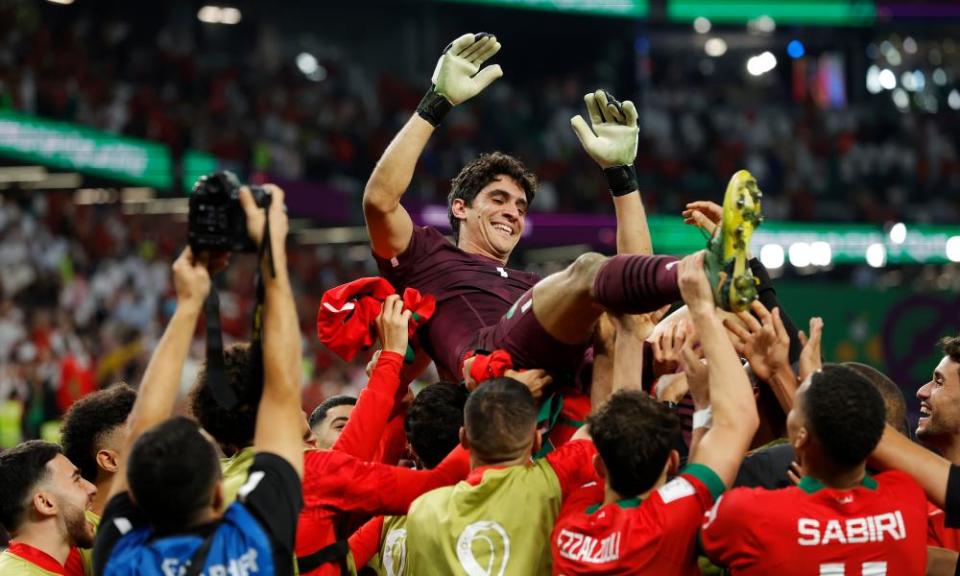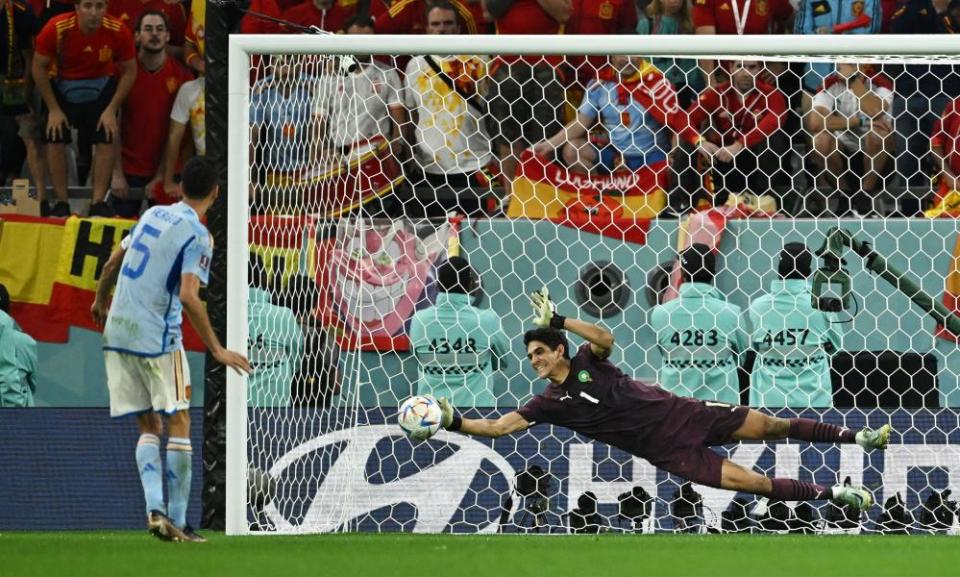Sliding doors moment has taken Bono to the brink of World Cup immortality

Video Assistant Referee Changed My Life. It’s not the most likely headline, but in Yassine “Bono” Bounou’s case it’s true. “Everyone is talking about him now,” Julen Lopetegui says. Two years ago, the Wolves and former Sevilla manager knows, plenty were talking about him too, just not for the right reason. Luckily, every now and then the VAR does something that suggests it’s not completely awful, and this was one of those times. That night, it rescued the man who has ended up rescuing Morocco, en route to making World Cup history.
It was February 2020, the Europa League round of 32. With a minute remaining against Cluj a fairly tame shot slipped under Bono’s body and into the net. Sevilla were out and so, in all probability, was he. Signed on loan from Girona, Bono was back up to Tomas Vaclik. He had played just 45 minutes in the league and two Copa del Rey games against fourth-tier opposition. The Europa League was his competition and, amidst whistles and tension, that had gone. So had he: that option to buy wouldn’t be taken up now.
This is a World Cup like no other. For the last 12 years the Guardian has been reporting on the issues surrounding Qatar 2022, from corruption and human rights abuses to the treatment of migrant workers and discriminatory laws. The best of our journalism is gathered on our dedicated Qatar: Beyond the Football home page for those who want to go deeper into the issues beyond the pitch.
Guardian reporting goes far beyond what happens on the pitch. Support our investigative journalism today.
But then the replays detected a handball in the buildup, the goal was ruled out and Sevilla scraped through on away goals. By the end of the season, they had won the competition and Bono was staying. He was also a hero – if not as much of one as he has become since. “It seems strange to imagine it, but his growth owes something to the VAR, but most of all to him,” the Sevilla goalkeeper coach Jose Luis Silva says.
Things were about to change. Within ten days of the game against Cluj, the pandemic closed stadiums, putting football on hold. Vaclik got injured; Bono got opportunities, and in conditions that allowed for his recovery to be complete. When they came back, games were played behind closed doors. Sevilla set up in Cologne for meetings with Wolves, Roma, Manchester United and Inter Milan. Against Wolves, Bono saved a Raúl Jiménez penalty and made a handful of superb saves against United. In the final, Romelu Lukaku was the man denied by an astonishing stop.
Bono had a winner’s medal, a contract, and a place as starter. It wasn’t enough just to make saves, he scored too. A new era had begun, his talent beginning to tell. Last season he won the Zamora award for La Liga’s best goalkeeper having conceded fewer than anyone. He has gone eight hours and a penalty shootout without an opponent beating him in Qatar – the only goal conceded was a freak own goal against Canada, the country where Bono was born and that he turned down at international level. An exceptional late save prevented João Félix from equalising for Portugal and he also denied Cristiano Ronaldo in added time. Morocco became the first African team to make the semi-finals.
Not that you would know it afterwards looking at how ridiculously calm Bono remained. Silva cracks up. “Honestly, Me and Marko [Dimitrovic, Sevilla’s second keeper] have tried to be like him and it’s impossible,” he says. “It’s incredible how calm he is: we talk about it, laugh at it. His calmness is worthy of study. He never seems worried, and that’s an important tool. It’s not relaxation because when it comes to competing, he has the tension he needs.”
He has always been like that. Born in Montreal, Bono is the son of a physics professor at university, and speaks five languages including Spanish with a soft Argentinian accent: he is an Argentina fan who sent his shirt to Ariel Ortega after the Spain game and named his dog after the forward – which will be awkward if they face each other in the final. Lopetegui describes him as having a “privileged mind”. Talk to teammates from Atlético Madrid, his first club in Spain having left Casablanca, and they say the same.
There, he often trained with the first team – the year Atlético won the league – and played with the B team. Tranquilo is the word, Isaac Nana says. Sergio Cidoncha says: “Very polite, quiet, so much so he almost went unnoticed. An introvert – and a brilliant goalkeeper.”

That tranquility perhaps hid the tension in those early months at Sevilla. There was a moment, says the former Sevilla goalkeeper Andrés Palop, soon after arrival at the club from Girona when he didn’t seem to have much confidence in himself. “I think he has grown a lot psychologically; and when he had to replace Vaclik, an undisputed starter, doing so during the pandemic helped him to not have too much pressure at a club where there’s always pressure. He has become very strong in that sense.”
Silva agrees: “That moment had affected him, as it would any keeper. He took a step forward during the pandemic. There’s no fans, we’re in Cologne, and his development is helped by that. He hadn’t had the opportunities he really needed before, to show his qualities.”
Those qualities are many. Palop provides a detailed technical analysis of a goalkeeper he describes as “very complete” and “among the 10 best in the world”: quick, with considerable reach and an advanced starting position, reading of the game, brave in the air, excellent one-on-one, good with his feet to escape the press and initiate play.
“When he came he was a very good reactive goalkeeper: despite his height and his size, he was fast, had good reflexes,” says Silva. “The coaches at Girona said he was fantastic with his feet. What evolved was his ability to understand the game. He’s adaptable, his understanding and behaviour is perfect. He worked here with [Jorge] Sampaoli and Lopetegui, who place a lot of importance on that understanding: looking for the free man, choosing the right zones. Even in dangerous situations, he’s good. You’ll see him dribble or even roulette.”
That was seen against Spain. So were the penalties. Afterwards, Bono said he knew about Pablo Sarabia, who took the first, but that he had not really studied them. It was, he suggested, more intuitive, a lot of luck involved.
And yet this is the man who has saved a penalty from Erling Haaland, who became the first goalkeeper to stop one from Mikel Oyarzabal, a specialist; denied Nabil Fekir in a Seville derby; and against Spain kept out a spot-kick from Carlos Soler, who once scored a hat-trick of them against Real Madrid and Thibaut Courtois. Silva doesn’t buy it, either: “Well, he says that,” the goalkeeper coach says, suggesting that there is more work and less chance than Bono wants to suggest. And that, too, says something.
“He’s never had any arrogance and never will,” Silva insists. “Bono has values that are hard to find in football. He spent almost the whole year not playing and I never heard a bad word, a gesture. He always helped Tomas. I think he’s the goalkeeper who has best accepted being a sub of all those I have coached. He always knew that his moment had to arrive, and now it has. In life, you always get something back and he has.”
“He’s very calm, very mature, very balanced,” Lopetegui says. “He’s an example: when he didn’t play, he kept quiet, supported his teammates and worked. He’s a pleasure to work with. He’s humble, and humility and intelligence always go together. He was a starter by the end of the first year, then the Zamora. Everyone is talking about him now. He’s got his reward and I’m very pleased for him.”

 Yahoo Sport
Yahoo Sport 





































